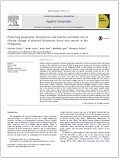| Journal Article |
 |
|
| Article Title | Predicting geographic distribution and habitat suitability due to climate change of selected threatened forest tree species in the Philippines | | Author | Kristine Garcia, Rodel D. Lasco, Amor Ines, Bradfield Lyon and Florencia B Pulhin | | Year | 2013 | | Journal Title | Applied Geography | | Institution | Elsevier | | Volume | 44 | | Pages | 12-22 | | Call Number | JA0488-13 | | Keywords | Climate change, Maxent, Geographic distribution, Threatened forest trees species, Habitat suitability |
|
| Abstract: |
| Climate change is projected to alter the geographic distribution of forest ecosystems. This study aimed
to evaluate the consequences of climate change on geographical distributions and habitat suitability of
14 threatened forest tree species in the Philippines. Based on the principle of maximum entropy, it
utilized a machine algorithm called Maxent to estimate a target probability distribution and habitat
suitability of the selected species. Threatened forest tree species occurrence records and sets of biophysical
and bioclimatic variables were inputted to Maxent program to predict current and future
distribution of the species. The Maxent models of the threatened species were evaluated using Receiver
Operating Characteristics Area Under Curve (ROC AUC) and True Skill Statistics (TSS) tests which
revealed that the models generated were better than random. The Maxent models ROC AUC values of
the 14 species range from 0.70 to 0.972 which is higher than 0.5 of a null model. Based on TSS criteria,
Maxent models performed good in two species, very good in ten species, and excellent in two species.
Seven species (Afzelia rhomboidea; Koordersiodendron pinnatum; Mangifera altissima; Shorea contorta;
Shorea palosapis; Shorea polysperma; Vitex parviflora) were found to likely benefit from future climate
due to the potential increase in their suitable habitat while the other seven species (Agathis philippinensis;
Celtis luzonica; Dipterocarpus grandiflorus; Shorea guiso; Shorea negrosensis; Toona calantas;
Vatica mangachapoi) will likely experience decline in their suitable habitat. This study provided an
initial understanding on how the distribution of threatened forest trees will be affected by climate
change in the Philippines. The generated species distribution models and habitat suitability maps could
be used as basis in formulating appropriate science-based adaptation policies, strategies and measures
that could enhance the resilience of those threatened forest tree species and their natural ecosystems to
current and future climate. |
|
|
Download file(s): Click icon to download/open file.
|
|
|
|
|
| Viewed in 1584 times. Downloaded in 0 times. |